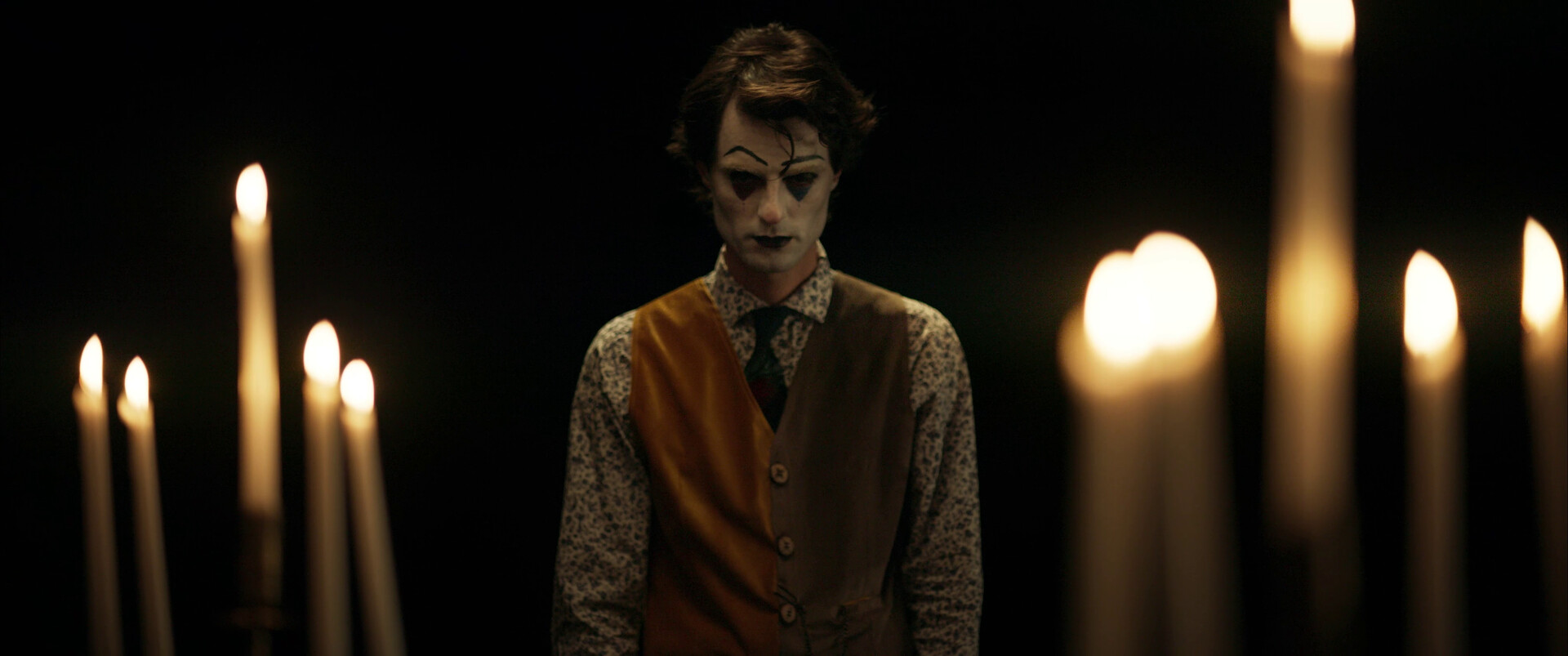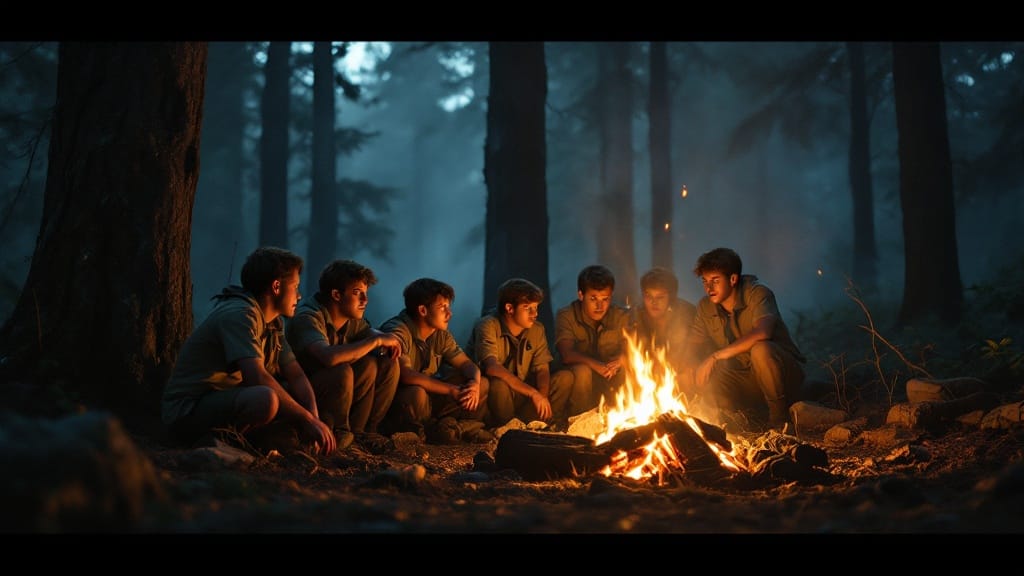Drama
The Act

Directed by Paniz Shahmoradi Fard
Warning – This review may contain spoilers.
The Act presents a surreal and thought-provoking narrative in which a clown sits at a table filled with food and drinks. As six stylishly dressed individuals enter, each hands him an envelope containing various requests. For each task the clown completes—whether it be a magic trick or something increasingly degrading—he earns a share of the food and drink. What begins as a performance quickly spirals into a dark commentary on the relationship between artists and their audiences. The requests become more demanding, pushing the clown into a state of mental and physical harm, illustrating the dehumanizing effects of sacrificing one’s artistry for survival.
At its core, The Act explores the psychological and emotional toll that performance takes on an artist when their work is shaped and manipulated by external demands. The clown’s gradual breakdown serves as a metaphor for how an artist can be coerced into diminishing their creative integrity to appease the audience. The film successfully portrays this complex dynamic through a narrative that feels simultaneously absurd and tragically poignant. The clown’s progression from lighthearted entertainer to a figure of suffering evokes empathy and raises important questions about the cost of creative expression in a society that values entertainment over authenticity.
Visually, the film is striking. The lighting enhances the mood of the piece, with the warm glow of the food-filled table contrasting against the colder, harsher light as the film progresses. The cinematography, particularly in the more intimate moments when the clown is grappling with the emotional weight of his performance, effectively immerses the audience in his experience. The editing is dynamic, creating a seamless flow between the increasingly unsettling requests and the clown’s reactions. Sound design, while somewhat hollow in certain areas, fits the overall surreal tone of the film, adding an eerie quality that underscores the disturbing nature of the clown’s predicament. Despite some of the sound feeling intentionally artificial, it works well within the context of the narrative, contributing to the film’s heightened reality.
The film’s metaphor of the clown’s struggle for food as a symbol for survival is powerfully communicated, though some aspects of the narrative could be interpreted as abstract, leaving viewers to piece together the full depth of its themes. Nevertheless, the clarity of the film’s message—the degradation of artistic integrity for the sake of societal approval—comes across effectively. The audience is left to question whether the clown’s efforts were worth the pain he endured, as the film closes without a satisfying resolution for the protagonist.
The Act is an ambitious and unsettling exploration of the artist-audience relationship. While its metaphor may be slightly abstract for some, its universal themes of sacrifice, survival, and the cost of art resonate deeply. The film’s visual strength and emotional weight make it a powerful debut for Paniz Shahmoradi Fard as a director. Audiences who enjoy thought-provoking, metaphorical narratives will find much to appreciate in this darkly compelling short film.
Comedy
Troop 458

WARNING! This review contains SPOILERS!
Troop 458, written by Trevor Allen, captures the often daunting, yet transformative, experience of being the new kid in a world full of unknowns. We follow Sidney, an anxious boy thrown into his first Boy Scouts campout, where he faces both the perils of acceptance and the strangeness of his eccentric scout leader. As spooky campfire tales start to weave into reality, Sidney is forced to confront his fears head-on, finding moments of humor, adventure, and unexpected camaraderie along the way.
I like the concept of Troop 458 because it blends coming-of-age themes with a playful sense of adventure, all wrapped in an atmosphere tinged with just the right amount of mystery. Allen’s writing brings to life a cast of memorable characters, especially through Sidney’s journey of growth. The tension between humor and fear feels authentic to the Boy Scouts’ setting, and it captures the real challenges kids face when trying to fit in.
What resonated with me most was the screenplay’s exploration of courage—not just in facing mythical dangers but in embracing who you are, quirks and all. Some aspects could benefit from a clearer focus on character motivations and tighter pacing to keep the momentum strong, particularly during scenes that blur the line between myth and reality.
The dialogue is great in many places, offering humor that feels natural for a group of young scouts. There were moments where I felt the conversations could be a bit sharper or more distinct to heighten the comedic or emotional impact. Character development is a strong suit, with Sidney’s evolution being both relatable and satisfying, but secondary characters could have a bit more depth to elevate the ensemble.
Allen’s Troop 458 is polished, with solid grammar, spelling, and formatting that adhere to professional standards. The structure is clean and makes for an easy read, setting up scenes that are visually compelling.
Troop 458 delivers an enjoyable mix of humor, heart, and a touch of the supernatural, leaving me eager to see how it might come to life on screen.
Drama
Ellie

WARNING! This review contains SPOILERS!
Directed by Marcus Mejia
Ellie is a refreshing experience that pulled me right into the world of a young, shy man navigating a work meeting while secretly yearning for a bit of magic in his everyday life. We’re taken through his imaginative, musical daydream—a beautiful escape from reality that reveals his true desires. I loved how the film peeled back layers of his personality without a single word of dialogue. Instead, the music carried the narrative, and surprisingly, it worked so well.
Marcus Mejia did an excellent job blending dramedy elements to keep the film engaging. The moments of humor and more emotional beats make the film feel well-rounded. Mejia’s choice to swap dialogue for music was a bold move, and it paid off. I could feel the character’s internal struggles and hopes as the music brought out emotions words couldn’t.
The lighting felt intimate, almost like it was giving us a window into the protagonist’s soul, and the cinematography perfectly captured the whimsical tone of his daydreams. I noticed how smoothly the editing transitioned between reality and fantasy, which made the story’s pacing feel just right. The sound design was on point, with every beat of music syncing beautifully with the character’s emotional highs and lows.
I loved when the protagonist’s daydream overlapped with reality, creating this seamless blend that felt so relatable. I admired how it portrayed the quiet, unspoken dreams we all carry. It was a reminder of the power of our inner worlds and how much magic lies just beneath the surface of our everyday lives.
Ellie left a gentle yet lasting impression. It’s a unique, heartfelt short film that shows how creative risks can pay off. Ellie is a memorable journey that’s definitely worth the watch.
Drama
Finding Acceptance

Directed by Andrew DeBennett
WARNING! This review contains spoilers.
Watching “Finding Acceptance” was an experience that brought me back to those anti-bullying films we’d see in school assemblies. The story follows Mary, a new student in a wheelchair, navigating the often-tough world of school friendships. Initially, she faces teasing from her peers but finds a genuine friend in Liz, who even manages to extend kindness to Mary’s bully, Max. The message is straightforward and clear: acceptance and empathy matter.
I could see what the director was aiming for—Andrew DeBennett notes that the film was both a joy to create and a personal project. The heart of the story shines through, with Kaylah Pollock (Mary) and Laney Hansen (Liz) bringing warmth to their roles. Their connection feels genuine, even if the overall story feels a bit too familiar.
Technically, the film could have used some fine-tuning. The sound mix was rough, with the music often drowning out dialogue. The editing also felt choppy, making it harder to stay immersed in the story. The dialogue leaned into clichés—phrases like “loser” felt outdated and took away from the realism. The cinematography, however, was a bright spot, creating a warm, inviting feel that suited the film’s positive message.
I felt like the story could’ve benefited from more depth. The bullying that Mary faces is minimal, making her eventual friendships feel somewhat predictable. For younger audiences, this simplicity might be engaging and easy to digest, but it misses the chance to delve into the more complex aspects of acceptance.
In the end, “Finding Acceptance” delivers a positive, albeit simple, message. While it didn’t connect with me on a deeper level, I can see it being a useful film for educational settings, especially for younger viewers learning about kindness and friendship.










